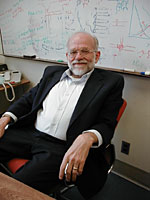By Dan Olson
Minnesota Public Radio
October 14, 2002
First it was hybrids, now it's fuel cells. The world's major car companies are in a race. They are trying to get models powered by hydrogen fuel cells to showrooms as early as next year. However, a University of Minnesota professor who is one of the country's top fuel cell researchers says there are some barriers. One is making the vehicles convenient for drivers.
| |
|
|
|
||
Hydrogen fuel cell technology, its boosters say, solves two huge problems. We're running out of crude oil, and hydrogen is a potentially unlimited, non-polluting replacement energy source.
Fuel cells strip electrons from hydrogen. The electrons are harnessed into electricity for power. The exhaust is water.
There are plenty of hurdles to overcome, however, before drivers decide to buy hydrogen fuel cell cars.
University of Minnesota Regents Professor and fuel cell researcher Lanny Schmidt says cars powered with hydrogen need to be filled more often than gasoline burners. "Right now the major challenge of hydrogen is that you can only get 50 to 100 miles per fillup and no consumer likes that," Schmidt says.
The driving distance problem will be solved, Schmidt says, when researchers figure out a way for vehicles to carry more hydrogen. "It can only be used if we can compress it to very high pressures and there are safety issues involved," he says.
In the meantime, two fuels, gasoline and natural gas, Schmidt says, are convenient sources of hydrogen for fuel cell powered engines. Using them solves one of the big problems facing hydrogen fuel cell technology, having enough places for the vehicles to gas up. "The gasoline filling station is on every corner," Schmidt says, "and we'd have to have the equivalent in hydrogen delivery systems if we were going to switch to a hydrogen economy."
General Motors, DaimlerChrysler and several Japanese automakers all say they'll have fuel cell powered cars in showrooms as early as next year.
Schmidt says consumers will drive how quickly hydrogen fuel cell technology spreads. He guesses people who spend lots on fuel may be among the first customers. "Probably the first market might be the SUV or the small truck," he says.
California, Japan and a few countries in Europe have hydrogen fuel cell prototype vehicles on the road and a handful of hydrogen filling stations.
Schmidt says Minnesota's way into the hydrogen era might be fueled by ethanol. He says it would be smart to steer support for ethanol as a gasoline additive into using the corn-derived fuel as a source of hydrogen. "It would be much more efficient to turn ethanol into hydrogen and power a fuel cell," Schmidt says, "and that's one of the challenges we're now working on."
Schmidt says making hydrogen fuel cells feasible for widespread use in vehicles is at least five to 20 years off.
Fuel cell technology is already proven and used in a range of other applications. NASA uses hydrogen fuel cells to power space probes. The military uses them for power in remote locations. U. S. companies including Minnesota-based 3M are investing in fuel cell technology because it can supply electricity for buildings and homes. A few utilities are investing in fuel cell technology for backup power units.
Schmidt says the world's poor or rapidly industrializing nations may drive hydrogen fuel cell innovation. "In the third world, China may never have electric wires running around the country, or a gas distribution system," he says, "they may use fuel cells directly."
Schmidt says most of the investment in fuel cell technology is coming from the private sector. Public sources include the National Science Foundation, the Department of Energy and the Department of Defense. The energy bill stalled in Congress would send some research money to hydrogen and other future sources. Critics say the measure as drafted spends too much on developing conventional fossil fuel supplies instead of exploring alternatives that will reduce our reliance on imported oil.

